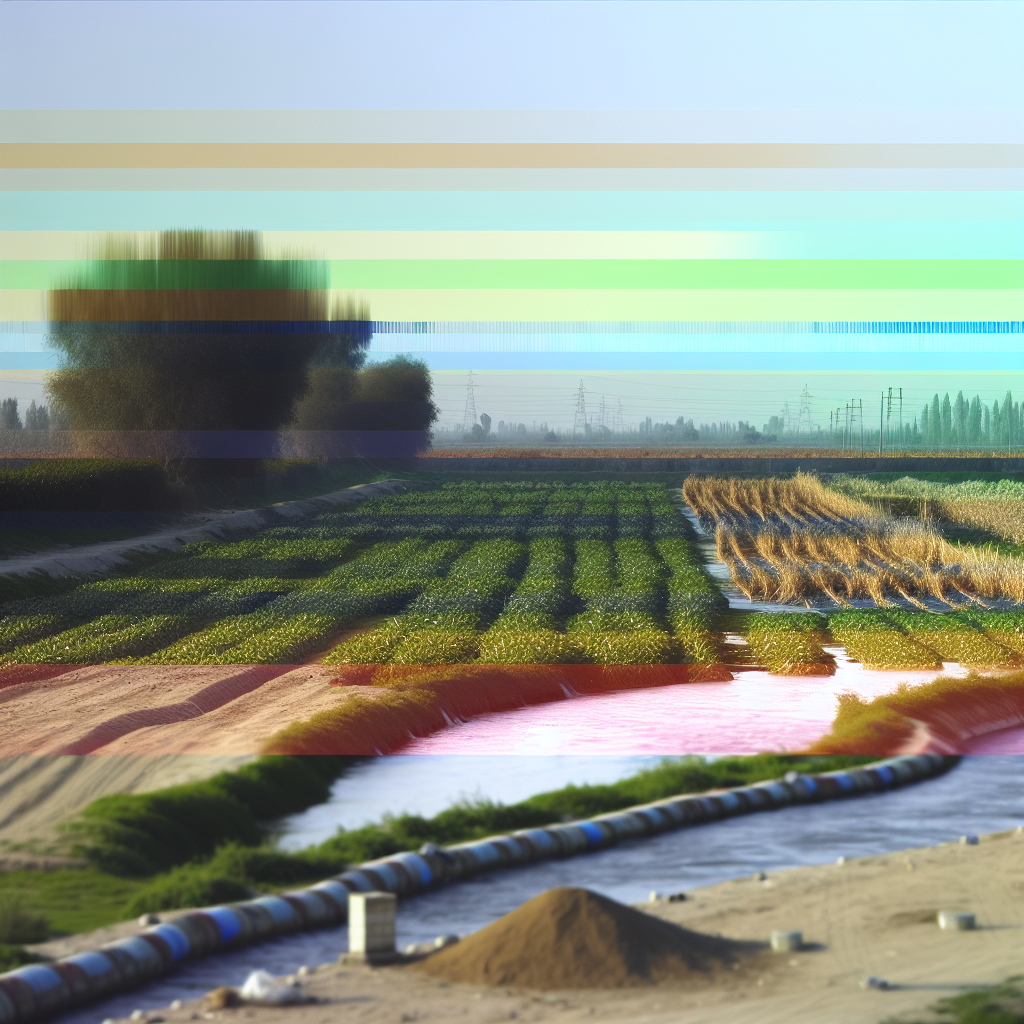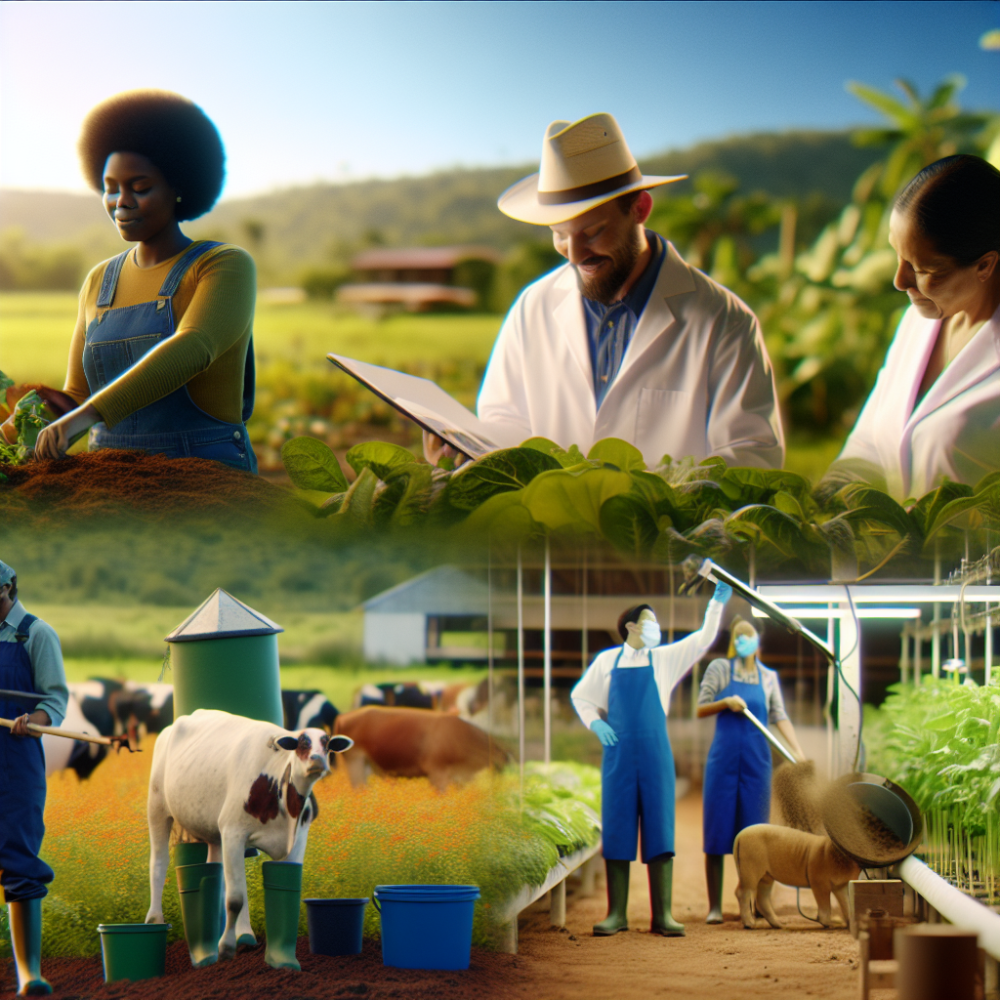The Importance of Sustainable Agriculture in Addressing Food Security
The Importance of Sustainable Agriculture in Addressing Food Security
Food security is a pressing global issue that affects millions of people around the world. With a growing population and increasing demand for food, it is crucial to find sustainable solutions to ensure that everyone has access to safe and nutritious food. Sustainable agriculture plays a vital role in addressing this challenge by promoting environmentally friendly practices that enhance productivity and preserve natural resources.
One of the key benefits of sustainable agriculture is its ability to increase food production while minimizing the negative impact on the environment. Traditional farming methods often rely heavily on chemical fertilizers and pesticides, which can contaminate soil and water sources. In contrast, sustainable agriculture focuses on organic and natural farming techniques that promote soil health and biodiversity. By using compost, crop rotation, and integrated pest management, farmers can maintain the fertility of the soil and reduce the need for synthetic inputs. This not only protects the environment but also ensures the long-term sustainability of agricultural systems.
Another important aspect of sustainable agriculture is its emphasis on water conservation. Water scarcity is a significant concern in many regions, and unsustainable irrigation practices can exacerbate this problem. Sustainable agriculture promotes efficient water management techniques such as drip irrigation and rainwater harvesting. These methods help to minimize water wastage and ensure that water resources are used wisely. By adopting these practices, farmers can reduce their reliance on freshwater sources and contribute to the overall conservation of water.
Furthermore, sustainable agriculture plays a crucial role in preserving biodiversity and protecting ecosystems. Traditional farming practices often involve the use of monocultures, which can lead to the loss of biodiversity and the disruption of natural habitats. In contrast, sustainable agriculture encourages the cultivation of diverse crops and the preservation of natural habitats. This helps to maintain a balanced ecosystem and supports the survival of beneficial insects, birds, and other wildlife. By promoting biodiversity, sustainable agriculture contributes to the overall health and resilience of agricultural systems.
In addition to its environmental benefits, sustainable agriculture also has significant social and economic advantages. By adopting sustainable practices, farmers can improve their livelihoods and enhance their resilience to climate change. Sustainable agriculture promotes the use of locally adapted crops and traditional farming techniques, which can help farmers cope with changing weather patterns and reduce their dependence on external inputs. Moreover, sustainable agriculture often involves small-scale farming, which can create employment opportunities and contribute to rural development. By supporting local farmers and promoting sustainable practices, communities can become more self-sufficient and less reliant on imported food.
In conclusion, sustainable agriculture plays a crucial role in addressing food security by promoting environmentally friendly practices that enhance productivity and preserve natural resources. By focusing on organic farming techniques, efficient water management, and biodiversity conservation, sustainable agriculture can increase food production while minimizing the negative impact on the environment. Moreover, sustainable agriculture has significant social and economic benefits, including improved livelihoods for farmers and increased resilience to climate change. As the global population continues to grow, it is essential to prioritize sustainable agriculture as a key solution to ensure that everyone has access to safe and nutritious food.
Exploring Career Opportunities in Organic Farming and Permaculture

Exploring Career Opportunities in Organic Farming and Permaculture
Organic farming and permaculture are two sustainable agricultural practices that have gained significant attention in recent years. As the demand for organic and locally grown food continues to rise, so does the need for professionals in these fields. If you have a passion for sustainable agriculture and a desire to make a positive impact on the environment, exploring career opportunities in organic farming and permaculture might be the right path for you.
One of the most common career paths in organic farming is becoming an organic farmer. Organic farmers grow crops and raise livestock without the use of synthetic fertilizers, pesticides, or genetically modified organisms. They focus on building healthy soil, promoting biodiversity, and using natural methods to control pests and diseases. Organic farmers often work on small to medium-sized farms and may specialize in growing specific crops or raising particular livestock.
Another career option in organic farming is becoming a farm manager. Farm managers oversee the day-to-day operations of organic farms, ensuring that all activities are carried out in accordance with organic farming standards. They are responsible for planning and implementing crop rotations, managing livestock, and coordinating farm workers. Farm managers also handle marketing and sales, ensuring that organic products reach consumers through farmers’ markets, community-supported agriculture programs, or direct sales to restaurants and grocery stores.
Permaculture is another sustainable agricultural practice that offers exciting career opportunities. Permaculture is a design system that aims to create sustainable and self-sufficient ecosystems by mimicking natural patterns and processes. Permaculture designers work to create food forests, regenerative landscapes, and sustainable communities. They use principles such as observation, integration, and diversity to design landscapes that are productive, resilient, and ecologically sound.
A career in permaculture can take many forms. Permaculture designers may work as consultants, helping individuals and communities design and implement permaculture systems. They assess the site, analyze the needs and goals of the client, and develop a comprehensive design plan. Permaculture designers may also teach permaculture courses and workshops, sharing their knowledge and skills with others who are interested in sustainable agriculture and regenerative design.
Another career option in permaculture is becoming a permaculture farmer. Permaculture farmers apply permaculture principles and techniques to their farming practices, creating diverse and resilient agricultural systems. They focus on building healthy soil, conserving water, and maximizing the use of resources on their farms. Permaculture farmers often integrate livestock, crops, and trees in their systems, creating a harmonious and productive ecosystem.
In addition to these career paths, there are also opportunities in research and education in both organic farming and permaculture. Researchers study various aspects of sustainable agriculture, such as soil health, pest management, and crop rotation, to develop innovative and effective practices. Educators play a crucial role in spreading knowledge and awareness about organic farming and permaculture, teaching courses and workshops, and inspiring the next generation of sustainable agriculture professionals.
In conclusion, exploring career opportunities in organic farming and permaculture can lead to fulfilling and impactful work in the field of sustainable agriculture. Whether you choose to become an organic farmer, a farm manager, a permaculture designer, or pursue a career in research and education, you will be contributing to a more sustainable and resilient food system. With the increasing demand for organic and locally grown food, there has never been a better time to embark on a career in sustainable agriculture and food systems.
Sustainable Agriculture and the Role of Agroecology in Climate Change Mitigation
Sustainable Agriculture and the Role of Agroecology in Climate Change Mitigation
Sustainable agriculture is an approach to farming that aims to meet the needs of the present generation without compromising the ability of future generations to meet their own needs. It is a holistic approach that takes into account environmental, economic, and social factors. One of the key components of sustainable agriculture is agroecology, which focuses on the interactions between plants, animals, humans, and the environment.
Agroecology plays a crucial role in climate change mitigation. Climate change is one of the greatest challenges facing our planet today, and agriculture is both a contributor to and a victim of climate change. The agricultural sector is responsible for a significant amount of greenhouse gas emissions, mainly through the use of synthetic fertilizers, pesticides, and fossil fuels. At the same time, agriculture is also vulnerable to the impacts of climate change, such as extreme weather events and changing rainfall patterns.
Agroecology offers a way to address these challenges. By adopting agroecological practices, farmers can reduce their greenhouse gas emissions and build resilience to climate change. Agroecology promotes the use of organic fertilizers and natural pest control methods, reducing the need for synthetic inputs. It also encourages the use of cover crops and crop rotation, which help to improve soil health and sequester carbon. Additionally, agroecology promotes the diversification of crops and livestock, which can help farmers adapt to changing climatic conditions.
Agroecology is not only beneficial for the environment but also for farmers and rural communities. By reducing their reliance on expensive inputs, farmers can improve their economic viability. Agroecological practices also promote biodiversity, which can help to protect against pests and diseases and enhance ecosystem services such as pollination. Moreover, agroecology promotes social equity by empowering farmers and promoting local food systems.
There are various career paths in sustainable agriculture and food systems that focus on agroecology and climate change mitigation. One such career path is that of an agroecologist. Agroecologists work with farmers to develop and implement sustainable farming practices. They conduct research, provide technical assistance, and promote knowledge exchange among farmers. Agroecologists also play a crucial role in advocating for policies that support sustainable agriculture and climate change mitigation.
Another career path is that of a sustainable agriculture consultant. Sustainable agriculture consultants work with farmers, businesses, and organizations to develop and implement sustainable farming practices. They provide advice on soil health, water management, and biodiversity conservation. Sustainable agriculture consultants also help farmers access funding and resources for implementing sustainable practices.
In addition to these careers, there are also opportunities in sustainable agriculture education and research. Sustainable agriculture educators teach courses on agroecology and sustainable farming practices. They also conduct research on topics such as soil health, crop diversification, and climate change adaptation. Sustainable agriculture researchers work on projects that aim to improve our understanding of the interactions between agriculture, the environment, and climate change.
In conclusion, sustainable agriculture and agroecology play a crucial role in climate change mitigation. Agroecological practices can help to reduce greenhouse gas emissions, build resilience to climate change, and promote social equity. There are various career paths in sustainable agriculture and food systems that focus on agroecology and climate change mitigation, including agroecologists, sustainable agriculture consultants, and sustainable agriculture educators and researchers. These careers offer opportunities to make a positive impact on the environment, farmers, and rural communities.
Career Paths in Food Systems Management and Sustainable Supply Chains
Career Paths in Food Systems Management and Sustainable Supply Chains
In the ever-evolving field of sustainable agriculture and food systems, there are numerous career paths that individuals can pursue. One such path is food systems management, which involves overseeing the entire process of food production, distribution, and consumption. This career path is crucial in ensuring that our food systems are sustainable and environmentally friendly.
Food systems managers play a vital role in coordinating the various stages of the food supply chain. They work closely with farmers, food processors, distributors, and retailers to ensure that food is produced, processed, and delivered efficiently and sustainably. This includes implementing practices that minimize waste, reduce carbon emissions, and promote the use of organic and locally sourced ingredients.
One possible career option in food systems management is becoming a sustainability coordinator. Sustainability coordinators work within organizations to develop and implement strategies that promote sustainable practices throughout the food supply chain. They may conduct audits to identify areas for improvement, collaborate with suppliers to source sustainable ingredients, and educate staff and customers about the importance of sustainable food systems.
Another career path in food systems management is supply chain management. Supply chain managers are responsible for overseeing the movement of food from farm to table. They work closely with farmers, transportation companies, and retailers to ensure that food is delivered on time and in the most efficient manner possible. Supply chain managers also play a crucial role in reducing waste and ensuring that food is distributed equitably.
In addition to food systems management, there are also career paths that focus specifically on sustainable supply chains. Sustainable supply chain managers work to ensure that the entire supply chain, from raw materials to final products, is environmentally friendly and socially responsible. They may work with suppliers to source sustainable materials, implement recycling and waste reduction programs, and ensure fair labor practices throughout the supply chain.
One potential career option in sustainable supply chains is becoming a sustainability consultant. Sustainability consultants work with companies to develop and implement sustainable supply chain strategies. They may conduct assessments to identify areas for improvement, develop sustainability goals and targets, and provide guidance on best practices for sustainable sourcing and production.
Another career path in sustainable supply chains is logistics management. Logistics managers are responsible for coordinating the movement of goods throughout the supply chain. They work closely with suppliers, transportation companies, and retailers to ensure that products are delivered efficiently and sustainably. This includes optimizing transportation routes, reducing carbon emissions, and implementing sustainable packaging practices.
In conclusion, there are numerous career paths in food systems management and sustainable supply chains. These careers are essential in ensuring that our food systems are sustainable, environmentally friendly, and socially responsible. Whether it be as a sustainability coordinator, supply chain manager, sustainability consultant, or logistics manager, individuals in these roles play a crucial role in shaping the future of our food systems. By working together to implement sustainable practices, we can create a more resilient and equitable food system for generations to come.





